
 |
| OCEANS HOME>DISCIPLINES |
| Disciplines: |
| Physical Oceanography ~ Faculty Physical oceanographers use numerical models, ship based observations, in situ instruments, and satellite or aircraft based remote sensing to understand processes in the ocean such as air-sea exchanges, surface and internal waves and turbulence, transport of water and chemical and biological tracers, and how the ocean and atmosphere interact to drive weather to climate timescale variability. At the University System of Maryland physical oceanographers teach and study a broad suite of ocean and climate related topics. These include estuarine, coastal and open ocean environments and often relate closely to studies of atmospheric forcing and circulation. Research programs in physical oceanography at USM are centered at College Park in the Department of Atmospheric and Oceanic Sciences (AOSC) and in the Earth System Science Interdisciplinary Center (ESSIC), and also in the University of Maryland Center for Environmental Science (UMCES). |
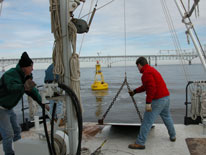 |
The AOSC (and ESSIC) offer courses in meteorology and physical oceanography at both the graduate and undergraduate levels. Graduate training in physical oceanography at UMCES is administered through the Marine Estuarine and Environmental Science (MEES) program, which offers an area of specialization in oceanography with a sub-field in physical oceanography. |
|
| Chemical Oceanography ~ Faculty Chemical oceanographers use laboratory studies, ship based observations, in situ instruments, numerical models, and satellite or aircraft based remote sensing to understand organic and inorganic chemical variability and cycling in the ocean, and also exchange of chemicals between the ocean and the atmosphere, and the benthos. These studies span timescales from seconds to millenia. At the University System of Maryland chemical oceanographers teach and study ocean biogeochemical cycling, marine environmental chemistry, toxicology and nutrient dynamics. These include estuarine, coastal and open ocean environments and also benthic processes and air-sea exchange. Research programs in chemical oceanography at USM are centered at College Park in the Department of Chemistry and Biochemistry (DCB) and in the Earth System Science Interdisciplinary Center (ESSIC), and also in the University of Maryland Center for Environmental Science (UMCES). |
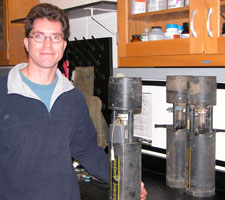 |
| The DCB (and ESSIC via the DCB) offers training in environmental chemistry and marine biogeochemical cycling at both the graduate and undergraduate levels. Graduate training in chemical oceanography at UMCES is administered through the Marine Estuarine and Environmental Science (MEES) program, which offers an area of specialization in environmental chemistry. |
|
| Biological Oceanography ~ Faculty Biological oceanographers use laboratory studies, ship based observations, in situ instruments, numerical models, and satellite or aircraft based remote sensing to understand biological variability and nutrient cycling in marine pelagic and benthic environments, focusing primarily on shallow and deep sea planktonic organisms and benthic flora and fauna in coastal, shelf and deep-sea bottom-dwelling communities. At the University System of Maryland biological oceanographers teach and study marine biogeochemical cycling, marine ecology, benthic biogeochemistry and ecology, nutrient and plankton dynamics, and coastal marsh and seagrass ecology. These include estuarine, coastal and open ocean environments and also more applied fields relating to ecosystem management and restoration ecology. Research programs in biological oceanography at UM are centered at College Park in the Earth System Science Interdisciplinary Center (ESSIC) and the University of Maryland Center for Environmental Science (UMCES). Related research programs that fall under the general heading of biological oceanography can also be found at the University of Maryland Biotechnology Institute (UMBI) in the Center of Marine Biotechnology (COMB), and at the University of Maryland Eastern Shore (UMES) in the Department of Natural Sciences. |
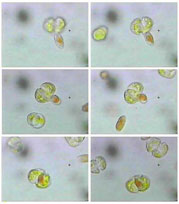 |
| ESSIC offers training in biological oceanography at both the graduate and undergraduate levels through the DAOS and the DCB at College Park, but does not offer a specific degree or specialization in this field. Graduate training in biological oceanography at UMCES, UMBI-COMB, and UMES is administered through the Marine Estuarine and Environmental Science (MEES) program, which offers an area of specialization in oceanography with a sub-field in biological oceanography. |
|
| Fisheries Oceanography ~ Faculty Fisheries oceanographers use laboratory physiological and genetic studies, ship based observations, acoustic methods, in situ instruments, population models, and satellite or aircraft based technologies to understand pelagic and benthic fish population dynamics and community ecology in open ocean, coastal and estuarine environments. At the University System of Maryland fisheries oceanographers specifically teach and engage in research on the ecology of marine and estuarine fishes, fish life history and migration studies, population dynamics of aquatic animals, aquaculture, fisheries management, and fisheries biotechnology. Research programs in fisheries oceanography at UM are centered at the University of Maryland Center for Environmental Science (UMCES), the University of Maryland Eastern Shore (UMES) and the University of Maryland Biotechnology Institute (UMBI) in the Center of Marine Biotechnology (COMB). |
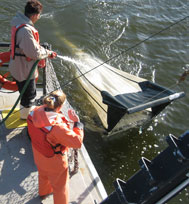 |
| Graduate training in fisheries oceanography at UMCES, UMES and UMBI-COMB is administered through the Marine Estuarine and Environmental Science (MEES) program, which offers an area of specialization in fisheries. |
|
| Marine Biotechnology
~ Faculty Studies in marine biotechnology involve the application of advanced chemical, physiological, microbiological and genetic research techniques to study the flora and fauna of pelagic and benthic environments in open ocean, coastal and estuarine systems. Marine biotechnology in the University of Maryland System is focused specifically on research and educational activities in aquaculture and fisheries biotechnology, marine functional genomics, marine environmental biotechnology, marine natural products and marine microbial processes. Research and graduate programs at USM are centered primarily at the University of Maryland Biotechnology Institute (UMBI) in the Center of Marine Biotechnology (COMB). Additional expertise in marine biotechnology-related fields can be found at UMCES in aquatic toxicology and marine microbiology and UMES in marine microbial ecology and molecular biology. |
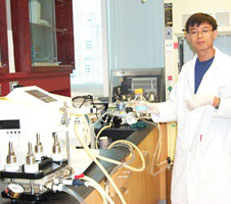 |
| Graduate training in marine biotechnology at UMBI-COMB, UMCES and UMES is administered through the Marine Estuarine and Environmental Science (MEES) program, which offers an area of specialization in environmental molecular biology and biotechnology. |
|
| Marine Geology ~ Faculty Marine geologists employ both traditional and state-of-the-art laboratory techniques, ship based observations, acoustic methods, in situ instruments and long-term observations to understand the dynamics of sediment transport and deposition, sediment geochemistry and plate tectonics, and also related phenomena such as oceanic crustal evolution and submarine seismic activity in both shallow coastal environments and the deep sea. These studies span timescales from seconds to millenia. Marine geologists at the University System of Maryland have expertise in areas such as paleogeology, paleontology, paleoceanography, plate tectonics, sedimentary geology, sediment transport, and marine geochemistry. This expertise is centered primarily in the Department of Geology at College Park. Additional expertise in marine geology can be found at the University of Maryland Center for Environmental Science (UMCES). | 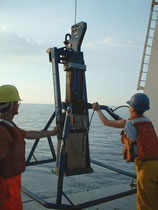 |
| The Department of Geology at College Park offers both undergraduate and graduate degrees in geology, but does not offer a specific degree or specialization in marine geology. Graduate education in geological oceanography at UMCES is administered through the Marine Estuarine and Environmental Science (MEES) program under the oceanography area of specialization. | |
| Climate Science ~ Faculty Climate scientists study the processes that contribute to longer time scale weather patterns. Climate scientists may study the interaction of the surface ocean with the atmosphere (air-sea processes), the transfer of chemical substances that affect the earths radiation balance between air and sea reservoirs, the manner in which the ocean or atmosphere contribute to climate patterns such as the North Atlantic oscillation, or to climate change. Research may include analysis of observations, or running numerical models of the climate system. | 
|
| At the University System of Maryland, most climate studies are linked to another discipline such as physical oceanography, atmospheric sciences, or biogeochemical response to climate variability. Research programs in climate science are centered at College Park in the Department of Ocean and Atmospheric Science (AOSC), and at the Earth System Science Interdisciplinary Center (ESSIC), at UMCES CBL and HPL, and at University of Maryland Baltimore County. Graduate training in climate related science is offered through AOSC (and ESSIC), as well as through the MEES program for UMCES researchers. Graduate programs at UMBC are offered through CEE. | |